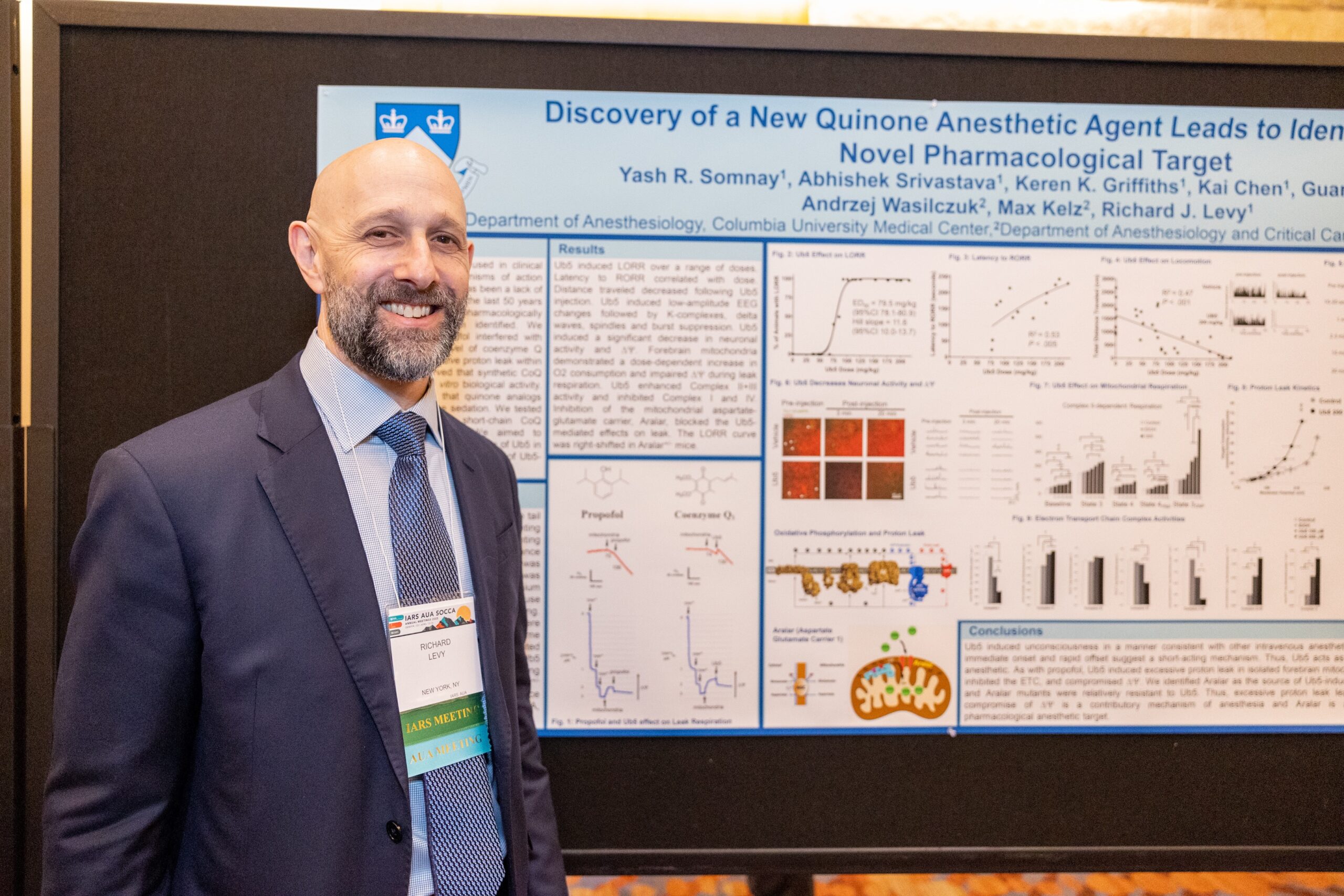Searching for a Safer Alternative to Propofol
An Interview with 2023 Kosaka Best Abstract Award Recipient in Basic Science – Dr. Richard Levy
 Richard J. Levy, MD, FAAP
Richard J. Levy, MD, FAAP
Professor of Anesthesiology and Pediatrics
Columbia University Irving Medical Center
New York, NY
Abstract Title:
Discovery of a New Quinone Anesthetic Leads to Identification of a Novel Pharmacological Target in Mice
Although he has gained recognition for his current research with the 2023 Kosaka Best Abstract Award in Basic Science, Richard J. Levy, MD, FAAP, is constantly striving and pushing himself to be a better and more prolific scientist. A professor of Anesthesiology and Pediatrics at Columbia University Irving Medical Center, he gains great value from poster sessions and awards sessions like those he participated in at the IARS 2023 Annual Meeting, receiving important feedback and constructive criticism from the best and brightest researchers in the anesthesiology specialty. With this input and his lab’s continued diligent work, Dr. Levy hopes their research on “Discovery of a New Quinone Anesthetic Leads to Identification of a Novel Pharmacological Target in Mice” will be able to translate into better outcomes for patients, eventually developing a new intravenous anesthetic for use in humans. In this interview, he shares his pathway to this specialty and some of his future hopes for this area of study.
1. For this research, you are…
Principal Investigator
2. What drew you to the anesthesiology specialty?
I first trained in pediatrics and developed an interest in pediatric critical care medicine. At the time, pediatric critical care medicine (PCCM) was closely related to pediatric anesthesiology. As such, the majority of pediatric intensivists around the country were dual trained in anesthesia and PCCM. I was advised by my mentors to train in anesthesiology to become a better pediatric intensivist. Following completion of my training in anesthesiology, PCCM, and pediatric anesthesiology, I gravitated toward pediatric cardiac anesthesia. I have practiced clinically as a pediatric cardiac anesthesiologist ever since.
3. What drew you to this area of research?
My current work stems from years of experience as a mitochondrial biologist. Data generated for this abstract resulted from our work with propofol toxicity in the developing heart.
4. What are the goals you most want to accomplish in your work with this project (or projects)?
We are hopeful that we will be able to translate our findings to patients; developing a new intravenous anesthetic for use in humans.
5. What is the potential impact of your research on the field of anesthesia and patient care?
The potential impact of our research is that we may have discovered a safer alternative to propofol (for long-term infusion). Future work will assess this. Also, since we have identified a novel anesthetic target, we hope we will be able use this knowledge to develop safer and more effective anesthetics in the future.
6. What are the benefits of presenting your research during poster sessions at the IARS Annual Meeting?
To allow our findings to gain wide exposure. Also, the poster sessions permit us to receive important feedback and constructive criticism from the best and the brightest researchers in the field.
7. How do you feel about receiving the Kosaka Best of Meeting Award?
This is an incredible honor. I am humbled and very thankful for the recognition.
8. How will this award affect your research and professional trajectory?
The award provides invaluable positive reinforcement. The recognition will stimulate me to work hard to advance this project.
9. Is there anyone else you wish to acknowledge as part of this research team?
All of my lab members who contributed to the work and Max Kelz and his team at UPenn.
10. Outside of your research, what might someone be surprised to learn about you?
I suffer from imposter syndrome and am constantly trying to be a better and more prolific scientist.
“The potential impact of our research is that we may have discovered a safer alternative to propofol (for long-term infusion). Future work will assess this. Also, since we have identified a novel anesthetic target, we hope we will be able use this knowledge to develop safer and more effective anesthetics in the future.”
– Richard J. Levy, MD, FAAP, 2023 Kosaka Best Abstract Award Recipient in Basic Science
International Anesthesia Research Society
